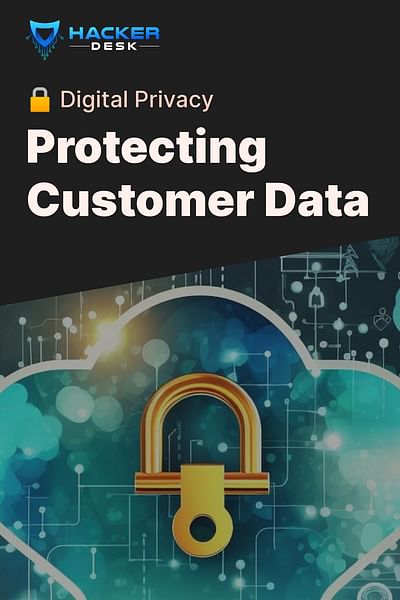Dean Reilly is a seasoned professional in penetration testing and ethical hacking. His unique methodology in uncovering security vulnerabilities has led to numerous organizations bolstering their cybersecurity measures. Dean strongly advocates for the dissemination of knowledge and frequently shares his insights on ethical hacking.
In today's digital age, ensuring the security and privacy of customer data is of utmost importance. With cyber threats becoming more sophisticated, it's crucial to implement robust measures to protect sensitive information. Here are some key strategies to help you safeguard customer data:
1. Implement strong access controls: Limit access to customer data only to authorized personnel. Use strong passwords, two-factor authentication, and role-based access control (RBAC) to ensure that only those who need access can obtain it.
2. Encrypt sensitive data: Encryption is a powerful technique that converts customer data into unreadable code, making it useless to unauthorized individuals. Implement end-to-end encryption for data in transit and at rest to protect it from interception or theft.
3. Regularly update and patch systems: Keep your systems and software up to date with the latest security patches. Vulnerabilities in outdated software can be exploited by attackers to gain unauthorized access to customer data.
4. Train employees on cybersecurity best practices: Human error is one of the leading causes of data breaches. Educate your employees about phishing attacks, social engineering techniques, and the importance of strong password hygiene. Regular training sessions can help create a security-conscious culture within your organization.
5. Implement network security measures: Deploy firewalls, intrusion detection systems (IDS), and intrusion prevention systems (IPS) to monitor and protect your network from unauthorized access. Segment your network to minimize the impact of a breach and regularly monitor network traffic for any suspicious activity.
6. Conduct regular penetration testing: Penetration testing, also known as ethical hacking, involves simulating real-world cyber-attacks to identify vulnerabilities in your systems. By proactively testing your defenses, you can discover and address weaknesses before malicious actors exploit them.
7. Adopt a data minimization approach: Collect and retain only the customer data that is necessary for your business operations. The less data you store, the less risk there is of it being compromised. Regularly review and delete any unnecessary customer data to minimize the potential impact of a breach.
8. Have a data breach response plan: Despite your best efforts, a data breach may still occur. Prepare for such incidents by creating a comprehensive response plan. This plan should include steps to contain the breach, notify affected customers, and work with law enforcement and regulatory authorities.
Remember, cybersecurity is an ongoing process. Stay informed about the latest threats and security best practices. Regularly assess and update your security measures to adapt to evolving threats. By implementing these strategies, you can protect your customers' data and maintain their trust in the digital age.
For more information on cybersecurity solutions, network security strategies, and penetration testing services, visit HackerDesk. We are your one-stop solution for all things related to cybersecurity. Stay updated and secure in the digital world!















